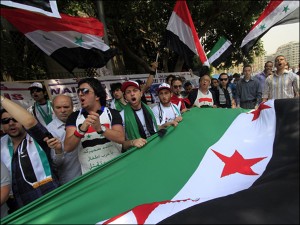UNITED NATIONS—The UN General Assembly on Friday approved Kuwait as a replacement candidate for Syria on the Human Rights Council amid growing alarm over the Syrian security forces’ violent crackdown on protesters.
Kuwait was among 15 countries that the assembly approved Friday for rotating three-year terms on the UN’s top human rights body.

Syrian protesters chant slogans and hold Syrian flags during a demonstration demanding that Syria's President Bashar Assad step down, in front of the Arab League headquarters building in Cairo, Egypt, Sunday, May 15, 2011. Hundreds of Syrians fled to neighboring Lebanon to escape a violent crackdown against an anti-government uprising that has claimed the lives of more than 800 civilians, Lebanese security officials and a leading human rights group said. AP
Kuwait was elected in secret balloting by most of the assembly’s 192 members. Syria received five votes, reflecting a strong campaign to keep it off the council.
UN officials including Secretary-General Ban Ki-moon and UN Hugh Commissioner for Human rights Navi Pillay have repeatedly called on Syria to stop the violence against peaceful demonstrators.
Kuwait announced Wednesday it was replacing Syria on the Asian slate for seats on the council amid widespread opposition to Syrian President Bashar Assad’s crackdown on opponents. Syrian human rights groups say more than 850 people have been killed by security forces since protests against Assad’s government began two months ago.
The other Asian candidates elected to the Geneva-based council were India, Indonesia and the Philippines.
The other new council members are Benin, Botswana, Burkina Faso, Republic of Congo, Czech Republic, Romania, Austria, Italy, Peru, Costa Rica and Chile.
Two other candidates, Georgia and Nicaragua, failed to get enough votes.
A major problem in the election process is that candidates for the Human Rights Council, and for many other UN bodies, are selected by regional groups where there is a lot of internal horse-trading for seats and support. Regional groups often put up uncontested slates to ensure victory for all their candidates.
“Without competition for seats on the Human Rights Council, the membership standards set by the General Assembly become meaningless,” said Peggy Hicks, global advocacy director at Human Rights Watch. “Manufactured slates of candidates may be easier for states, but they are bad for the council.”
“The standards set by the General Assembly for Human Rights Council membership need to be more than just words,” Hicks said. “We need competitive elections, and a yearly audit of whether council members are cooperating with the council as they have promised.”
UN Watch, an Geneva-based advocacy group, had campaigned against Syria’s membership on the council, but noted that Kuwait’s rights record was not much better.
It said the Philippines, along with candidates Burkina Faso, India and Indonesia, has questionable qualifications for council membership.

